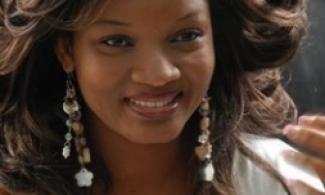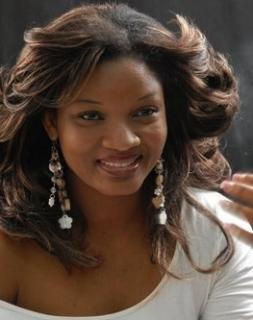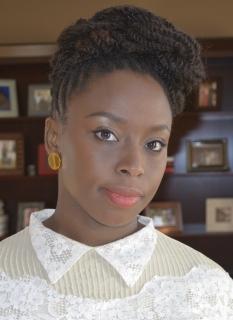

While Nigerian men are busy chasing rats, the feminists’ march is advancing in Nigeria. It is doing so in spite of recent hiccups in the plan.
On March 2, 2014, Punch newspaper published an interview with actress Omotola Jalade-Ekeinde and her husband, Mathew, under the caption, “I don’t believe in gender equality.” Around the same time, the Sun newspaper published an interview with writer Chimamanda Ngozi Adichie under the caption, “Nobody Can Force Me to Change My Name.”
While Omotala’s interview is still available for readers online, Adichie’s interview has since been removed by the Sun newspaper. The newspaper initially published an apology saying that due to deadline pressure they mistakenly published an unedited version of the interview. It has been three months and they have not finished editing the interview. Fortunately, several blogs picked up excerpts from the interview before it was pulled.
That’s how hot the debate is.
If you’re tuned in, you will know that it did not start today. From the 1929 Aba Women revolution to when the likes of Fela’s mother, Funmilayo Ransome-Kuti, led a revolution in women’s rights in Nigeria, the march has not subsided. In the 70s and 80s, writers like Buchi Emecheta, Flora Nwapa and Zaynab Alkali all pushed for advancement. On popular media, there was May Allen Ezekiel (MEE). MEE’s advocacy started at Quality magazine. Then she took it to her columns for Weekend Concord newspaper and, later, to her own Classique magazine. Every generation of women finds a voice in one of their own.
MEE was the first to talk the talk and walk the walk. She promoted women at Classique magazine (Letty Diai). As a high flying single mother, she argued in her Classique magazine column that a woman’s self-actualization should not be tied to having a man. Many read it to mean that a woman did not need a man to be self-actualized. When she married Richard Mofe-Damijo and gushed about it, a lot of women followers felt betrayed.

Going through the views of Omotola and Adichie on the place of women in Nigerian society, one thing is clear: there are skirmishes brewing in the relationship between men and women. Whatever paradigm shift will occur at the end will depend on society’s response to the viewpoints of these two different, yet, influential women.
In the interview with Punch, Omotola was asked about her role in her family. Here is her answer:
“I don’t believe in gender equality,” she said. “I do not believe that God made man and woman to be equal in any way. I believe that in every organised institution, there is always a head and an assistant. It doesn’t mean that one should take the other for granted, or disrespect the other. I believe the husband is the head of the home and the wife is an assistant.”
She went on to illustrate her point with the relationship between a pilot and the co-pilot.
“My husband is a pilot, I have flown with him several times and I understood that here is a captain and a co-pilot,” she said. “They are both responsible for the passengers’ lives. But when there is a final decision to make, it is up to the captain to make it. He is more experienced and the one with the responsibility. But any mature captain will not ignore his co-pilot because the co-pilot is not a cabin attendant. He is there for a reason. It just depends on how you understand and play your roles.”
Omotola went on to say, “I believe women should understand this. When a woman starts a struggle for power tussle with him, it tends to cause friction in the home. The woman should give the man the respect as the head of the home and also prove herself as a worthy co-pilot. He needs to see you as a reliable co-pilot. Sometimes, he may not be the one running the house day-to-day, you are the one to take decisions but you have to do it in such a manner that he is comfortable enough to see you as someone he can rely on.”
Adichie’s interview with the Sun newspaper started with her correcting the reporter for addressing her as Mrs. instead of her preferred Miss. “Before we start, please, I just want to say that my name is Chimamanda Adichie,” she said. “That’s how I want it; that’s how I’m addressed, and it is not Mrs but Miss. Ms: that’s how I want it. I am saying this, because I just got a mail from my manager this morning. It seems that there are people who attended the church service, and they wrote about it, addressing me as Mrs. Chimamanda (Esega). I didn’t like that at all. So my name is Chimamanda Adichie, full stop!”
The ruffled reporter tried to suggest that calling Adichie Mrs was part of our culture. She cut in: “What does our culture do? Let me tell you about our culture. This thing that you are calling our culture –that when you marry somebody, you’ll start calling her Mrs. Somebody –is not our culture; it is Western culture. If you want to talk about our culture, you need to go to people in real Igbo land. But it is true.”
Adichie went on to lecture the reporter about her grandfather, David Nwoye. Nwoye, the son of Adichie’s great-grandmother, Omeni, is properly identified as Nwoye Omeni: Nwoye, the son of Omeni. “So, conversation about culture is a long one,” she snapped. “I don’t even want to have it.”
But she went into that conversation about culture in her second TED Talk titled, “We Should All Be Feminists.”

“We raise girls to cater to the fragile egos of men,” she said. “We teach girls to shrink themselves, to make themselves smaller. We tell girls “you can have ambition, but not too much. You should not aim to be successful, otherwise you will threaten the man…”
She continued: “We teach girls shame- close your legs, cover yourself! We make them feel as though by being born female they’re already guilty of something. And so girls grow up to be women who cannot see they have desire. They grow up to be women who silence themselves. They grow up to be women who cannot say what they truly think. And they grow up- and this is the worst thing we do to girls- they grow up to be women who turn pretense into an art form.”
At the verge of every paradigm shift, the conservative wing and the liberal wing often slug it out in a battle to shape the future. Ideally, the conservatives want to preserve what is good about the past while the liberals want to destroy what is bad about the past. But in reality, the conservatives hold on to more than the good while the liberals destroy more than the bad. The radical elements of each side often duck it out before the battle is taken to the open arena.
In the case of women rights, the open arena is where men, eager to protect their privileges, wade in. But some women also side with the men against what they see as the radical elements of the feminist movement.
The radical elements of the feminist movement frame the conflict as men versus women. They are eager to upturn the whole society in one swoop. Represented in popular culture was the 1960s bra-burning women, they are often seen as anti-men. They take delight in bashing men. Some go as far as declaring men unnecessary. These are the killer feminists. Their stance on several issues frightens a cross-section of women who would rather sit this struggle out than indulge in an open confrontation with men.
For these killer feminists, there is no way to be angry about women’s plight without showing angst at generations of men that propagated it. To them, there is no way to promote women emancipation without perpetuating men emasculation. For them, the only way to imbibe the core essence of feminism is to embrace its excesses.
There is no doubt that the life of the African woman could be horrible.
Early marriage. Lack of educational opportunities. Sexual harassment. Lack of appreciation at home and at work. Zero hereditary rights. Domestic abuse. Rape. Zero control of reproductive right. Discrimination. Sexism. Lack of equal pay for equal work.
Often a culture that oppresses women is the same culture that elevates them. We have to be careful as we untangle decades and decades of tradition so that we ‘do not put a knife on the thing that held us together....’
In my own part of the world, there is no group as powerful as the Umu Ada, the daughters of the clan- not the age mates, not the king and his cabinet, and not the titled men, nze-na-ozo. Umu Ada may not break the kola nut but they surely put fear in the hearts of the miscreant members of their community, be they oha or eze.
Women play a great role in perpetuating tradition. Should they have the conversation amongst themselves about tweaking the tradition to fit 21st century needs of women or should they involve men in that conversation? How best do we get men involved in the discussion? Is it by confronting men’s ego or by crushing their manhood? Can women be empowered without importing some unpleasant aftermaths of radical feminism as seen in western societies?